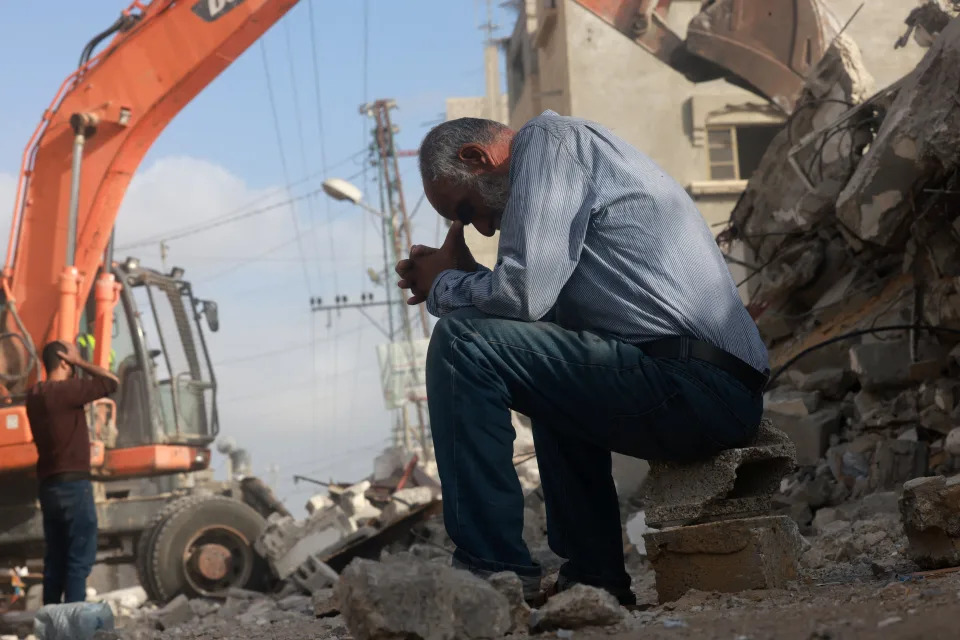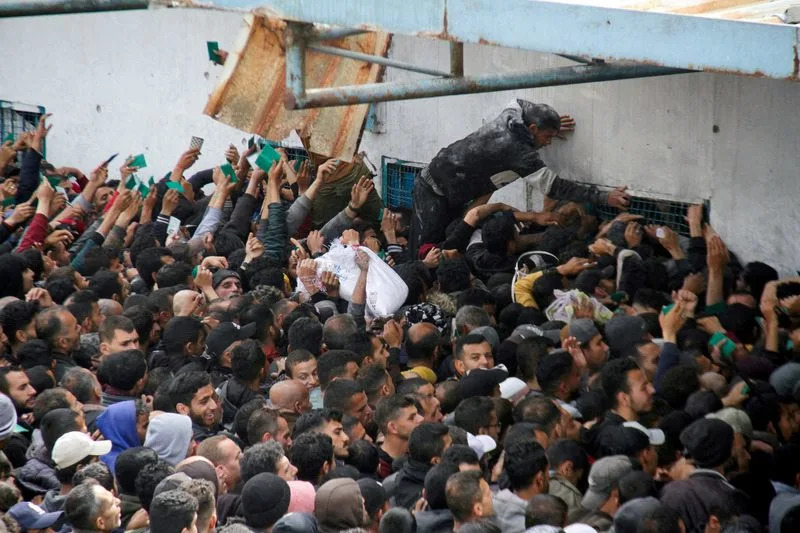Israeli bombs pounded northern Gaza on Tuesday as Hamas’ military wing called for an escalation against Israel and the overthrow of Jordan’s monarchy.
Amid the spike in violence, David Satterfield, the U.S. regional envoy for humanitarian issues, said the risk of famine in Gaza, especially in the north, was “very high.” Gaza has seen a "slight increase" in the number of aid trucks arriving from Egypt and Jordan, Federico Dessi, Middle East director for the aid group Humanity & Inclusion told USA TODAY, "but it is still far below the level we need."
Last month, President Joe Biden demanded that Israeli Prime Minister Benjamin Netanyahu open Gaza to more humanitarian aid, but supplies remain backed up at different border crossings. Dessi, whose organization helps people with disabilities and those injured by war, said 12 truckloads of wheelchairs and crutches had been waiting since January to cross from Jordan.
The renewed shelling and bombing of northern Gaza comes almost four months after the Israeli army said it was drawing down troops there, saying it had pushed Hamas out.
In a social media post, Israeli army spokesman Avichay Adraee urged residents of four zones in Beit Lahiya on Gaza's northern edge to move to shelter in two designated areas.
Adraee said the military "will work with extreme force against terrorist infrastructure and subversive elements." On Tuesday night, he reported that six rockets had been fired from northern Gaza and Gaza City toward Israel.
Fleeing war, again
"We hear people are fleeing today, we don't know where − to the south or to other parts of the northern Gaza Strip," Dessi said.
Abu Ubaida, spokesperson for Hamas' al-Qassam Brigades, called for an escalation across all fronts in a televised speech marking 200 days since the Oct. 7 start of the war, when 1,200 Israelis were killed 253 taken hostage in a Hamas rampage across southern Israel. More than 30,000 Palestinians have been reported killed in the ensuing war.

The spokesman celebrated Iran's thwarted April 13 attack on Israel and called for residents to rise up in the West Bank and in Jordan, calling it "one of the most important Arab fronts."
The Jordanian air force shot down dozens of Iranian drones headed for Israel as they crossed over Jordan during the April 13 attack. "We call on the Jordanian people to step up their actions and raise their voices," Abu Ubaida said. Israel retaliated for the swarm of more than 300 drones and missiles with a limited strike on Iran last Friday.
Hamas wants an end to the Israeli military offensive before it frees hostages
He said Hamas was sticking to its demands in cease-fire talks that Israel end its military offensive and call off its siege of the coastal enclave before the remaining hostages can be freed.
Israel “is stalling in reaching a hostages-swap deal and is trying to obstruct efforts by the mediators to reach a ceasefire agreement," Abu Ubaida said.
A spokesman for Qatar foreign ministry said earlier on Tuesday that all parties to the conflict should "show seriousness" to allow a cease-fire to succeed.
"After six months of war and humanitarian effort, we are counting the days to a real cease-fire," Dessi said.
Famine risk 'very high' in Gaza, especially in north, US official says
Palestinians gather to receive aid outside an UNRWA warehouse in Gaza City.
Israel has taken significant steps in recent weeks on allowing aid into Gaza, the U.S. special envoy for humanitarian issues said on Tuesday, but considerable work remained to be done as the risk of famine in the enclave is very high.
David Satterfield declined to say whether Washington was satisfied by Israel's moves, weeks after U.S. President Joe Biden demanded action to alleviate the humanitarian crisis in Gaza, saying conditions could be placed on U.S. support for close ally Israel if it did not implement a series of "specific, concrete and measurable" steps.
"Israel has taken significant steps in these last two and a half weeks," Satterfield told reporters. "There is still considerable work to be done. But progress has been made."
The risk of famine throughout war-devastated Gaza, especially in the north, is "very high", he said, calling for more to be done to get aid to those in need in that part of the tiny, densely populated Palestinian territory.
The United Nations has long complained of obstacles to getting aid in and distributing it throughout Gaza in the six months since Israel began an aerial and ground offensive against Gaza's ruling Islamist militant group Hamas.
Israel's military campaign has reduced much of the territory of 2.3 million people to a wasteland with an unfolding humanitarian disaster since October, when Hamas ignited war by storming into southern Israel.
The head of the U.N. Palestinian refugee agency (UNRWA), Philippe Lazzarini, said on Tuesday that the daily average number of trucks entering Gaza during April was 200 and that there had been a peak on Monday of 316.
"We have always stressed that we were in a man-made situation and it can only be addressed by political will and decisions, and the last few days show this is possible," he told reporters. "The more we sustain this, the more we will have a positive impact."
There was also now a focus on garbage collection, he added, especially in southern Gaza, in a bid to avoid disease outbreaks as the warmer weather approaches.
UNRWA has been described by top U.N. officials as the backbone of aid operations in Gaza. But earlier this year, Israel accused 12 UNRWA staff of taking part in the Hamas-led Oct. 7 attacks that triggered the Gaza war. Israel's allegations led 16 countries to pause or suspend funding of $450 million to UNRWA.
Lazzarini said UNRWA currently has enough funding to pay for operations until June. However, funding by the U.S. - UNRWA's biggest donor at $300 million to $400 million a year - has been suspended by the U.S. Congress until at least March 2025.
"If it is a lasting suspension it will have sustainable impact on the agency. If it is a temporary suspension, I do believe we can find a temporary solution with some donors stepping in," Lazzarini said.
He also said there has been an "extraordinary kind of grassroots solidarity" with UNRWA, which had raised $100 million from online public donations in the past six months.



